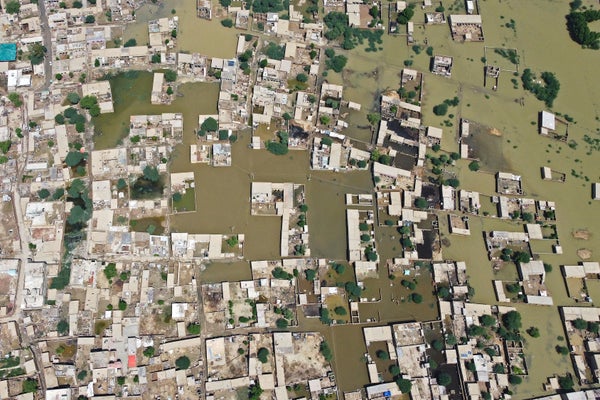CLIMATEWIRE | Negotiators struck a fragile agreement Saturday over the outlines of an international fund for climate-ravaged countries after hours of acrimonious haggling foreshadowed likely divisions at the global climate talks later this month.
The agreement, stitched tenuously together long after sunset in Abu Dhabi, United Arab Emirates, included a provision demanded by the U.S. that says payments into the fund would be voluntary — leaving the Biden administration with the option of not contributing.
The troubled talks over climate aid came weeks before nearly 200 nations will meet in Dubai, United Arab Emirates, for a global climate conference beginning on Nov. 30 and highlighted the mistrust that developing countries have with the U.S. and other wealthy nations following years of unmet financial promises.
On supporting science journalism
If you're enjoying this article, consider supporting our award-winning journalism by subscribing. By purchasing a subscription you are helping to ensure the future of impactful stories about the discoveries and ideas shaping our world today.
The weekend debate left almost everyone dissatisfied, including the U.S.
“This is a take-it-or-leave-it text,” said Outi Honkatukia, a Finnish negotiator who co-chairs the committee of 24 countries that's responsible for designing the climate fund.
The document provides recommendations on the structure of the climate fund for poorer nations that experience unavoidable damages from rising seas, intensifying floods and longer droughts — known as loss and damage in United Nations parlance. The proposal will be taken up at the global climate talks known as COP 28.
The text also proposed that the World Bank would host the fund on a four-year interim basis — a partial win for the U.S. — and tasked a future board with creating a system for distributing the fund’s money. The U.S. proposed housing the fund at the World Bank permanently.
“Billions of people, lives and livelihoods who are vulnerable to the effects of climate change depend upon the adoption of this recommended approach at COP 28,” Sultan Ahmed al-Jaber, the Emirati president of this year’s conference, said in a statement.
Drama infused the talks into their final moments. After Honkatukia banged her gavel down and declared the text final, the U.S. negotiator, Christina Chan, told the group “it is not a consensus document.”
A State Department official said in an email that the U.S. was pleased that the committee was able to reach agreement “on many aspects” of the loss and damage fund.
“At the same time, we regret that the text does not reflect consensus concerning the need for clarity on the voluntary nature of contributions,” the official said.
Some climate activists criticized the outcome.
“That the U.S. finally could not even agree with the massively watered-down text after cornering developing countries into accepting it, is a testimony to its lack of good faith effort to actually deliver an effective fund,” said Lien Vandamme, a senior campaigner at the Center for International Environmental Law.
Unresolved issues hung over the committee when it began meeting Friday in Abu Dhabi, including where the fund would be hosted and which countries would have access to its money. But determining who would contribute cash was the most fraught issue.
Developing countries blamed the U.S. and other wealthy nations for failing to support poor, vulnerable countries after climate-fueled disasters.
Avinash Persaud, the lead negotiator for Barbados, called it a “challenging but critical outcome,” one that despite the difficulties represents an important step forward.
“It was one of those things where success can be measured in the equality of discomfort. But if we had failed, it would have cast a long shadow over COP,” he said.
The final text urges developed countries to provide financial support and says the fund can receive money from a wide variety of sources beyond governments, including the private sector and “innovative sources.”
Both developed and developing countries said they would agree to the text in the hope that they could improve the fund going forward.
“There are a lot of things we wanted and we couldn’t get,” said Diann Black-Layne, a negotiator for an alliance of small island states. “I can leave here knowing that we will live to fight another day.”
Agreement to create the fund was a shining achievement at last year’s climate talks in Egypt after decades of resistance by the U.S. and other rich nations.
A 24-member committee representing rich and poor countries has been working this year to hammer out the details of how the fund would operate.
But the talks collapsed last month amid deep divisions between developed and developing countries. Frustrations mounted to the point that Egypt’s negotiator threatened to hold the U.S. and other big polluters legally liable for climate damages if they refused to pledge money to the fund.
The U.S. has pressed the committee to make the contributions voluntary, saying rich countries are not obligated under the Paris Agreement to pay for loss and damage. The U.S. has long faced opposition from within Congress for climate funding.
A 2009 pledge by rich nations to deliver $100 billion annually by 2020 to help poorer countries recover from climate impacts remains unmet. Developing countries want the separate loss and damage fund to also receive $100 billion a year by 2030.
So far, only a handful of small countries have pledged money to the future loss and damage fund. The U.S. is not among them.
The committee’s recommendations will now go to country negotiators to discuss at COP 28, with a goal of putting the fund into operation as soon as possible.
Reprinted from E&E News with permission from POLITICO, LLC. Copyright 2023. E&E News provides essential news for energy and environment professionals.
